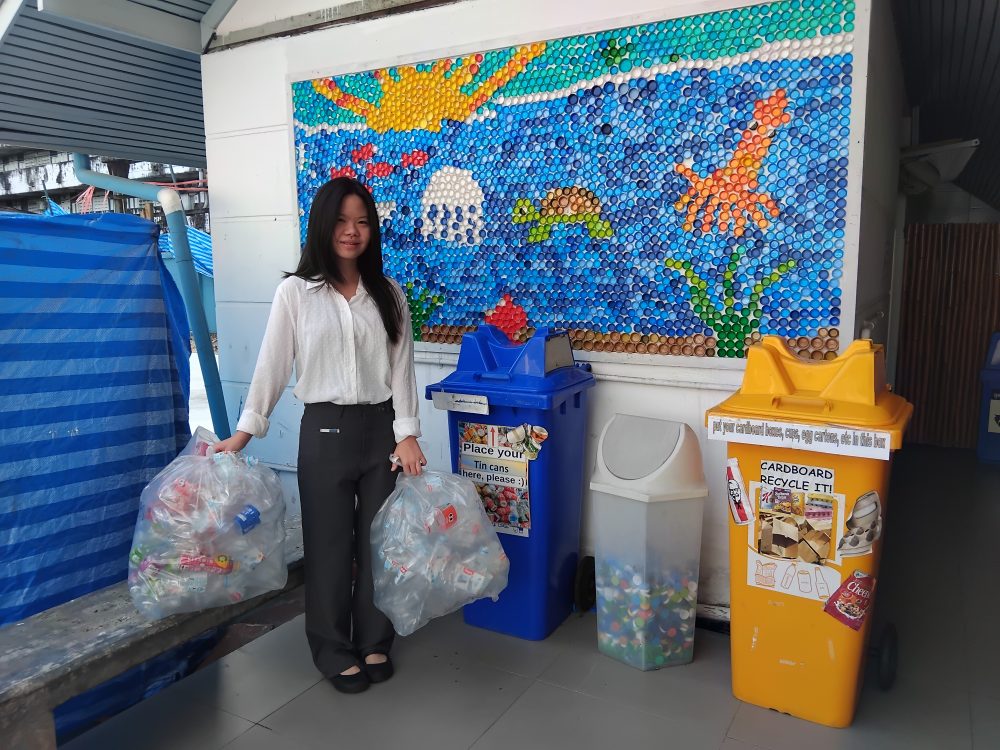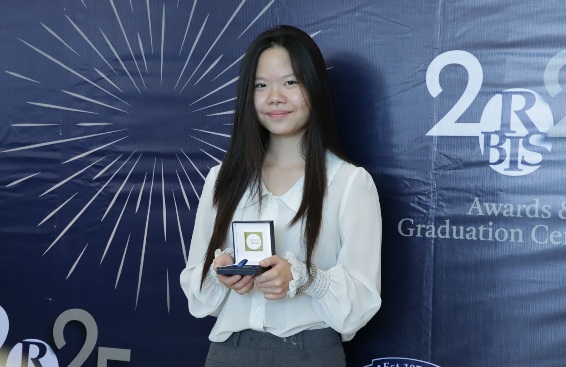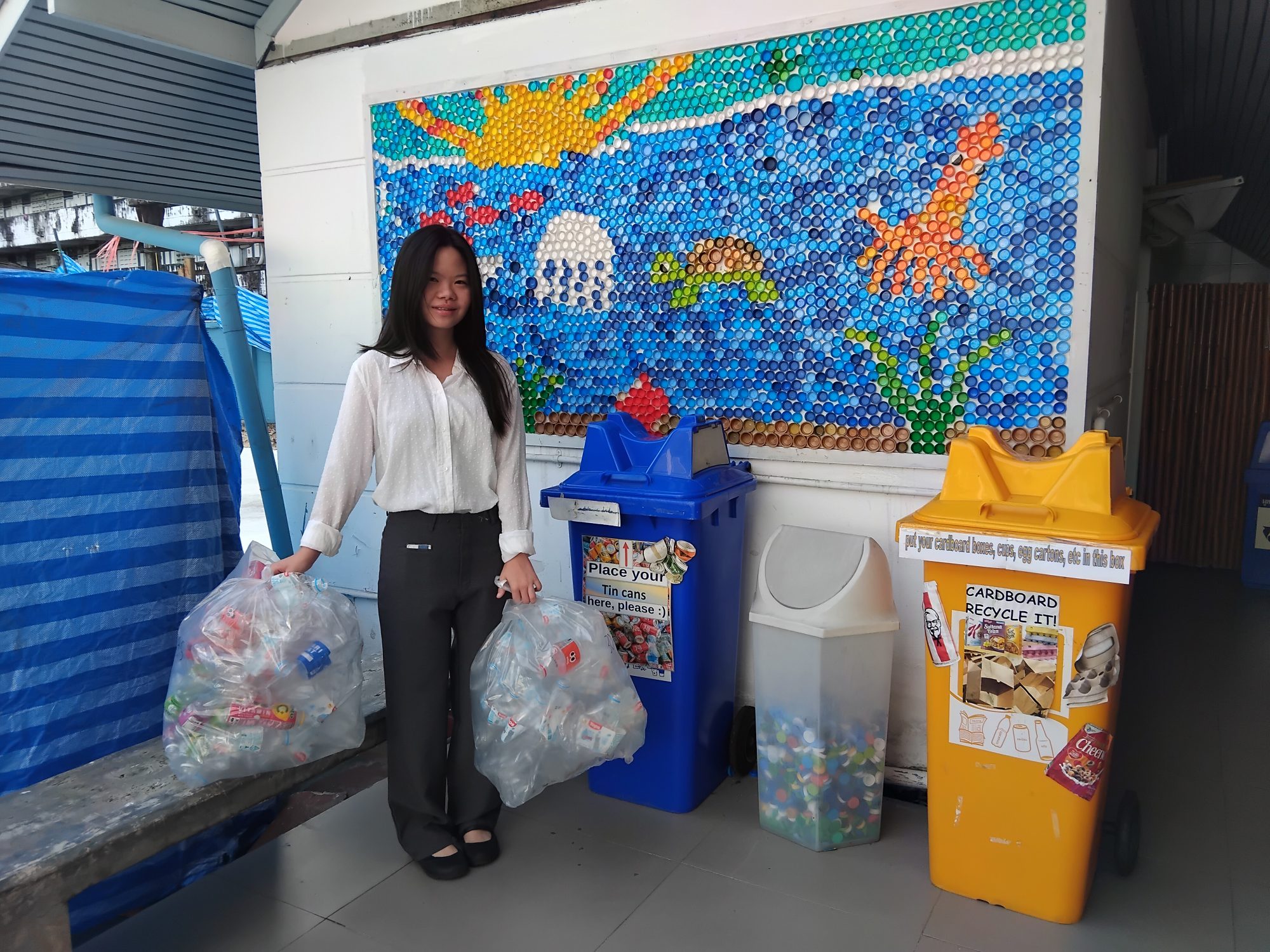
A King Constantine Medal Story – Nammon, RBIS International School, Thailand
When Aunyaporn Vitayakornbundit (Nammon) realised her classmates at RBIS International School in Thailand were not recycling, she decided to lead by example. What began with her collecting bottles and cans soon grew into a school-wide project that inspired friendly competition, brought her community closer together, and even supported a foundation creating prosthetic limbs from ring pulls. In recognition of her efforts, RBIS awarded her the King Constantine Medal. With this October’s Discovery Month’s focus on Commitment to Sustainability, her story is a reminder that even the smallest actions can have a lasting impact:
When I first noticed how few students at RBIS were contributing to our recycling programme, I felt that something had to change. Recycling is part of our community service motto, yet hardly anyone seemed to take it seriously. I realised that if I wanted to see a difference, I had to step up and be the role model.
In my neighbourhood, the amount of trash produced each week was overwhelming. Seeing that waste pile up motivated me to start collecting it, not only to help my local area but also to strengthen my school’s recycling programme. I began with small steps—being more conscious of what I threw away and making sure to recycle whenever I could. Then I encouraged my family and friends to get involved too. Most of them used plastic water bottles, so I asked them to keep those aside for me. Without their support, I would never have been able to achieve what I did.
Once I had collected all the recyclables, I worked with Mr Reed, our head of community service, and my classmates to sort them into the right categories. Plastics went into one pile, cardboard into another, and then there were cans, bottle tops, ring pulls, straws, cups, cereal boxes—the list was endless. Together we collected hundreds of bags of items that otherwise would have gone straight into landfills. Instead, they were sent to recycling centres where they could be reused.
Some of those items had an even greater purpose. For example, all of the ring pulls we gathered were donated to a foundation that uses them to create prosthetic limbs for amputees. Knowing that something so small and often overlooked could make such a life-changing difference to someone else made me proud of the effort we were putting in.
Of course, it was not always easy. One of the biggest challenges was convincing students at school to bring in their own recyclables. At first, the response was slow and at times it felt discouraging. But I persisted. I kept reminding everyone why recycling mattered and how it connected to our responsibility as a Round Square school. Gradually, people started to take notice.
A turning point came when we added a little competitiveness to the mix. My classmates and I began competing to see who could collect the most, and suddenly the atmosphere changed. Recycling became fun. What had started as a duty turned into a challenge that brought us together. Before long, more and more rubbish was being brought in, and I could see the impact spreading throughout the school.
This project not only strengthened the sense of community within RBIS, but also brought my own family closer together. We worked side by side to collect recyclable waste, carefully sorting and setting it aside, knowing we were preventing it from ending up in a landfill. That shared effort became a source of pride for all of us.
Receiving the King Constantine Medal for this work was a real honour. I never expected to be recognised, because I did not start the project for an award. But to be acknowledged in this way felt like a validation of the effort I had put in, and it gave me even more motivation to continue.
The experience has taught me that even the smallest actions can make a huge impact. A single plastic bottle recycled, a single ring pull collected, can change the bigger picture when multiplied by many hands. My message to anyone who wants to start a project like this is simple: do not be afraid of failure or lack of interest. Just start. Even if the beginning feels slow, persistence will bring results.
I am proud of how far we have come at RBIS, but this is only the beginning. I plan to keep encouraging my peers to recycle and to take part in community service opportunities. I hope that, together, we will continue to build on the progress we have made and show that small steps really can lead to meaningful change.


How to Start a Recycling Project at Your School
Are you inspired by Nammon’s success? Here are some practical steps you can take to make a difference in your own community:
- Lead by example – Be proactive about recycling yourself; others will follow when they see you care.
- Involve family and friends – Small contributions, like saving bottles or cans, add up quickly when collected together.
- Work with your school – Partner with a teacher or staff member to keep the project organised.
- Connect to a bigger purpose – Show how recyclables can make a difference, like donating ring pulls to create prosthetic limbs.
- Make it fun – Friendly competition can motivate people to take part and build momentum.
- Celebrate progress – Share results and milestones so everyone sees the impact.
- Keep building – Do not stop once it starts working. Keep encouraging participation and look for new opportunities.
